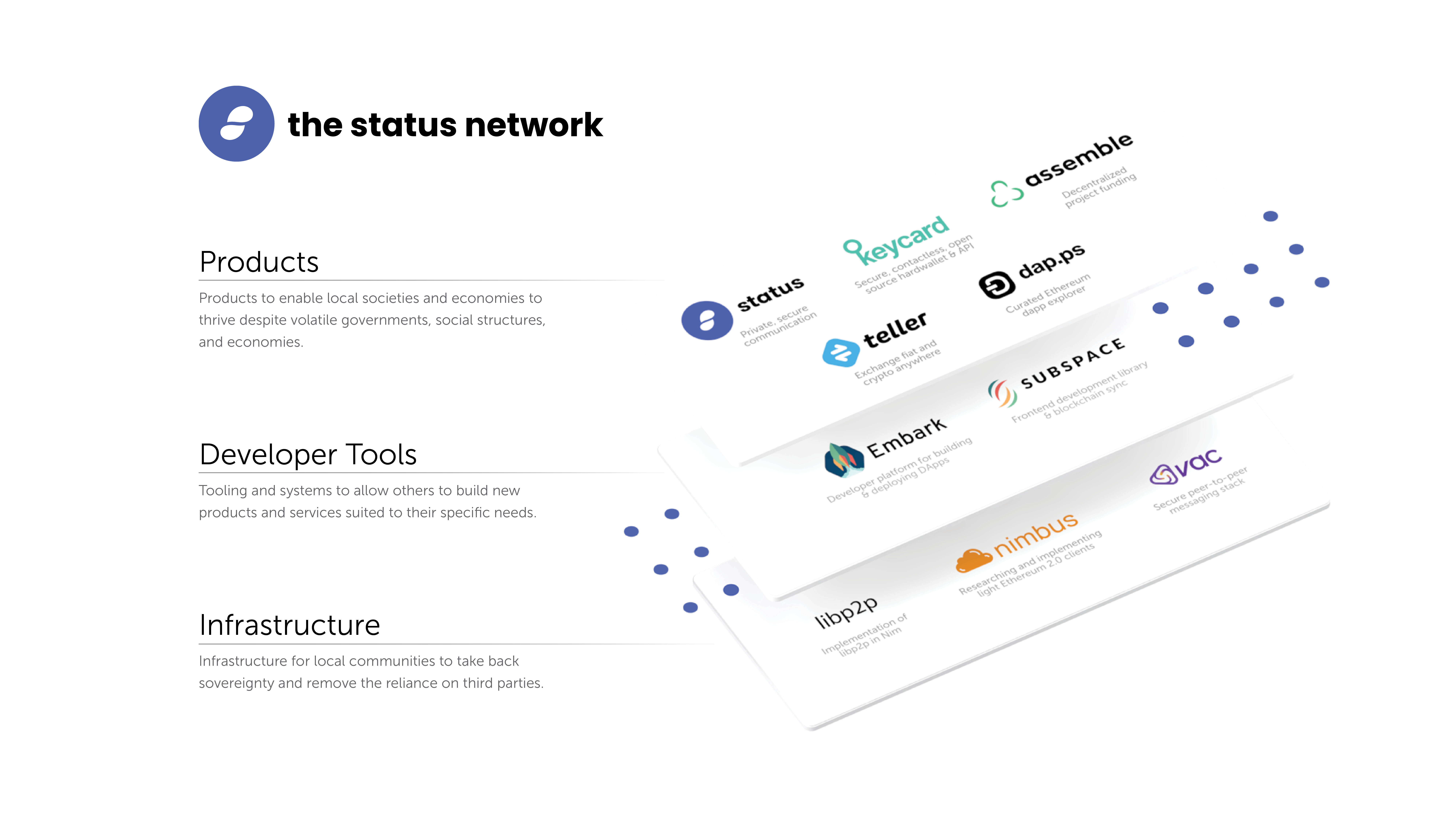The Status Network is a group of independent projects built to work together. Our technology stack aims to provide people with:
- Secure communication - Apps for private communication and the freedom to organize.
- Frictionless commerce - Access to open financial services and tools to trade.
- Mobile-first solutions - Equal access to technology across many hardware types.
The Network achieves this with products, developer tools, and infrastructure to empower communities to transact securely, communicate freely, and organize with confidence. While each component can be used independently to suit the specific needs of a developer or community, they are designed with interoperability in mind.

Products - Apps & Hardware
The Status Network Products are open source solutions for social and financial problems that can be customized or extended to add features as needed. Our Products give out-of-the-box options for end users in need of secure finance and social applications, and add modular customizability to The Status Network technology stack.
Status App - Private, secure communication – Chat, Browse, Transact
The Status App is a private peer-to-peer messenger, crypto wallet, and web3 browser. Use the Status App to chat securely with anyone, and enhance the experience with Dap.ps services, games, markets, and more.
Keycard - Secure, contactless, open source hardwallet & API
Keycard delivers hardware in card form that can unlock the vast potential of blockchain in the physical world—a secure, contactless, open source, hardwallet for simple integration with crypto wallets. In the future Keycard can bring secure crypto storage to point of sale merchant payments through an open source payments network.
Assemble - Decentralized project funding (coming soon)
Assemble is The Status Network funding mechanism for any web3 project. Anyone can propose a project that will enhance the mission of decentralized tech, and join The Status Network in building solutions together.
Teller - Exchange fiat and crypto anywhere (coming soon)
Teller is a decentralized global fiat to crypto exchange network built with mobile-first communities in mind. Teller makes it fast, safe, and easy for anyone, anywhere in the world to obtain the currency of their choice. Exchange with real people, across the secure, private network.
Dap.ps - Curated Ethereum dapp explorer
Dap.ps is a decentralized dapp store that curates the growing ecosystem of dapps, providing interconnections to allow users to explore and customize a web3 experience of their own.
Developer Tooling
Developer tools Embark and Subspace reduce the burden developers face when building truly peer-to-peer applications. These libraries allow developers to jump in to dapp development quickly with the support and documentation needed to create new dapps for the world.
Embark - All-in-one developer platform for building & deploying DApps
Embark is a developer platform to open dapp development and deployment to anyone. It includes comprehensive beginner tutorials for fledgling devs and new-to-dapps devs alike, and advanced tooling for sophisticated dapp development.
Subspace - Frontend development library & blockchain sync
Subspace is a JS library to facilitate frontend dapp development, allowing dapps to sync with smart contract data and work smoothly with UI. It is framework agnostic and embraces reactive programming with RxJS to act as a helpful bridge for front-end development trying to access smart contracts.
Infrastructure
To build fast and quality user experiences, web3 devs need a framework that enables the decentralized web. Our infra teams are building the base layers for security, privacy, censorship resistance, and scale so others can build on top of the new internet.
Nimbus - Researching and implementing light Ethereum 2.0 clients
The Nimbus team works to enable Eth 2.0 scaling to mobile devices. As 2.0 brings speed, proof of stake, and more, Nimbus is working to ensure that Ethereum dapps will scale to many levels of mobile hardware.
Vac - Secure peer-to-peer messaging stack
Vac is a modular peer-to-peer messaging stack with a focus on secure messaging. To build secure private messaging at scale, The Status Network built our own open infrastructure to allow secure p2p messaging to be easily accessed and scaled.
Libp2p - Implementation of libp2p in Nim for mobile phones & other resource restricted devices
Libp2p enables peer-to-peer decentralized network nodes to operate privately, yet maintain quality, secure connections for the network. It allows a peer on the network to securely advertise how other nodes can connect to it using many protocols such as QUIC, TPC or WebRTC depending on the network needs. The result is a highly reusable plug and play library compatible with a wide range of projects in different programming languages.
How they combine - stronger together
The projects above are built by independent teams, but designed to work together for incredible user experiences.
For example, Nimbus will help Ethereum work on mobile devices with lower computing power. This will make the Status App and any dapp on Dap.ps work faster, creating quality user experiences for social, financial, gaming, or other dapp experiences.
Subspace and Embark let developers build and ship dapps with real-time smart-contract sync data. This provides more options for dapps to work with smart contracts in real time and builds a richer Status App experience. This can allow for more natural flows between Status App, Keycard, and Teller implementations, and may rely on Vac or Nimbus depending on the features included in the dapps created.
The Status Network Token - SNT
The Status Network Token (SNT) is the native token in the Status Network, and each project in the network can add SNT support if desired. It acts as a multi-purpose token that governs the network, powers product features, and incentivizes ongoing initiatives.
Learn more about SNT tokenomics from our token research models.
The Status Network is open-source, which means you are welcome to contribute to individual projects, support outreach (Ambassador), or propose your own project to support the mission.
Learn more, and get involved at thestatus.network.
